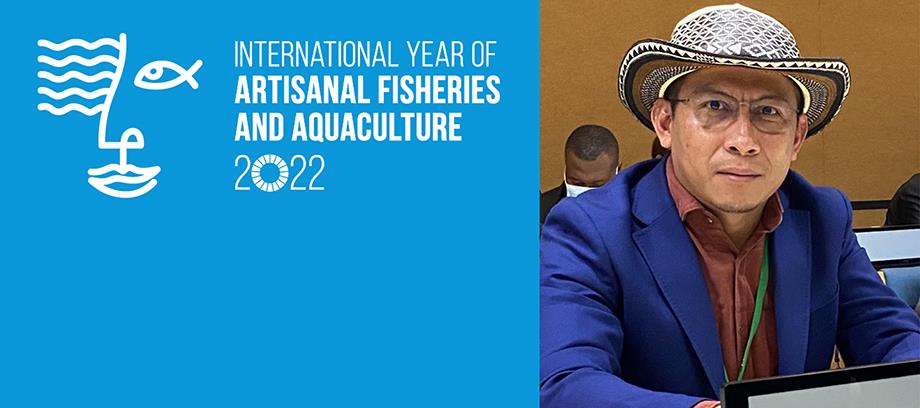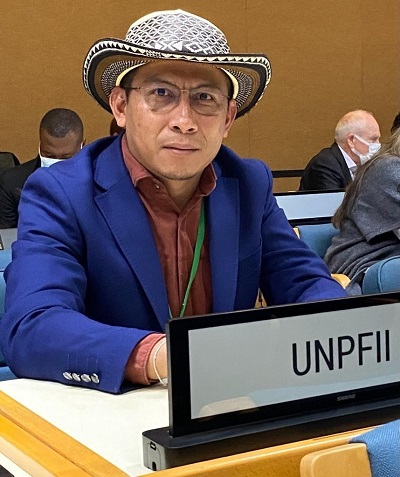IYAFA: Interview with Darío José Mejía Montalvo, President, UN Permanent Forum on Indigenous Issues

 |
How are artisanal fisheries and aquaculture related to the culture of indigenous peoples and how do these practices contribute to their livelihoods?
For many of our Peoples, the Earth is the source of life. For others, life comes from the sea, the winds or the mountains. The water, lakes, rivers, seas represent our grandfathers, grandmothers, our parents, while the beings that live there are living beings that also have rights.
For the Indigenous Peoples, the relationship with water bodies is not only economic or nutritional; it goes beyond that because their identity is based on rivers and lakes, their way of life and worldview is intrinsically linked to water bodies. An example is the Emberá People who inhabit the territories that today are known as Colombia and Panama. Embera’s entire language is based on the syllable Do, which means river.
Water as a source of life is connected to our territories and the territories allow the great diversity of our food systems to outcrop, a diversity that allows life to flourish in different environments from the arid lands inhabited by my Mbororo brothers in Chad, to my Zenu People in Colombia, where we live from different activities that are combined by following the rhythm that nature sets for us.
Our territories, the knowledge of the cycles of nature and respect for them, and our holistic, nature centric approach make us custodians of 80% of the biodiversity that we still have on the planet, despite only covering less than 25% of the world's surface.
How can IYAFA 2022 help to generate more attention on the importance of artisanal fisheries and aquaculture for indigenous communities and their contribution to achieving sustainability?
It is very important that 2022 has been declared the international year of artisanal fishing and aquaculture. Currently, there are important debates on how to face the great challenges of this era: climate change and the need to develop food systems that allow us to feed our population with nutritious food without depleting natural ecosystems.
In this context, it is important to increase the visibility of challenges that limit and affect the development of traditional fishing by Indigenous Peoples and their relationship with water bodies such as lakes, rivers or seas. To do so, it is important to first understand that Indigenous People’s harvests are based on adaptation to the ecosystem and not the other way around, as happens in modern food systems, where production practices are imposed on the environment. So, when our food systems work well in their entirety, they can preserve nature and while sustaining our communities in a healthy manner.
For many Indigenous Peoples, fishing practices are part of a system of activities that allow them to generate livelihoods and food in a sustainable way. They are combined with other activities, such as harvesting, planting or hunting, and it is nature itself that indicates when to fish and when not to, and when a part of the food system is affected, an imbalance is created.
Unfortunately many Indigenous Peoples today face unique challenges in maintaining traditional fishing practices, which has led them to adopt new ones and to change their foods in order to be adapt to the market and the wider society. Among these challenges we find the contamination of ancestral waters within Indigenous Peoples territories due to chemical and mercury spills, a result of extractive activities or waste that comes from the cities.
Similarly, in many communities the rivers, which are usually the primary sources of food for the Indigenous Peoples, have been diverted in favor of mining companies and irrigated land. Many Indigenous Peoples have seen their water bodies invaded by hydroelectric plants and by mega projects that are gradually destroying the existing life in those lakes or water centers; in other cases, the government authorities limit the access of Indigenous Peoples to ancestral waters that they have used for centuries.
Could you mention three priority actions that should be promoted at global level to contribute to the improvement of the living conditions and food generation conditions of Indigenous Peoples, especially fishing communities, while ensuring respect for their culture and traditions?
Yes. Firstly, it is important to recognize and promote the preservation of Indigenous Peoples’ food systems. Today there is more evidence that our systems, developed and based on the cycles of nature, are both sustainable and resilient. However, at the same time we know they face more threats than ever before. It is urgent that we develop policies with Indigenous Peoples that allow the strengthening and preservation of these ancestral food systems, which have allowed the safeguarding of biodiversity and nutritious food for communities for centuries. These systems include the coordination of a large number of activities, including fishing, agriculture, hunting, gathering, forest and land management, and this is the reason why these policies must have a systemic approach and not a sectoral one.
On the other hand, it is essential to understand and guarantee the collective rights of Indigenous Peoples to territory and natural resources since our mechanisms of governance, social structure, knowledge and our languages, culture and traditions are the basis of our life and food systems, and must be preserved.
Thirdly, I would like to invite every person participating in the fishing sector, whether they are from Governments, international organizations, civil society or the private sector, to review their projects, work programs and policies, and analyze whether the activities they carry out impact in some way or another the rivers, lakes or seas located within Indigenous Peoples’ territories. Finally, I recommend you check if these actions contemplate the vision of the Indigenous Peoples about those water bodies and the beings that inhabit there.
Our relationship with water bodies goes beyond just fishing; this is about our ancestors and this is about the origin of life. So, when projects are developed without our free, prior and informed consent, and without considering our point of view, not only are our fishing practices affected, but also our existence as Peoples, our identity, the transmission of knowledge from one generation to another and our system of food and livelihoods.
What are the lessons can we learn from the Indigenous Peoples in the framework of achieving fisheries sustainability?
We Indigenous Peoples have never seen water and the beings that inhabit rivers, lakes and seas as resources, for us they are sacred beings. From our worldview, our relationship with Mother Earth determinate the rights and obligations we have. In relation to our rights, we still face many challenges in terms of recognition and protection by the government. However, in relation to our duties to protect nature, the water that is life and Mother Earth, we are ahead. We have demonstrated with facts that our knowledge and our ways of life allow us to generate food and livelihoods in harmony with nature, and we have preserved rivers, lakes and seas for centuries, both feeding on them and taking care of them because for our Peoples these water bodies have the same right as human beings and other living beings, and must be respected.
In recent years, we have seen that the recognition of Mother Earth and rivers’ rights as living beings has advanced within national legal frameworks. The case of the Atrato river in Colombia is an example of this. This constitutes a fundamental progression, which will allow punishing those who pollute, destroy or negatively affect rivers and water ecosystems. This is also an example of how the vision of Indigenous Peoples can be integrated into government dialogue to influence positive change for the preservation of Mother Earth. These intercultural dialogues are key to the policies of the fishing sector, since our vision and sustainable practices are often not visible in public policy.
The world has been discussing the environment and sustainable development for more than 50 years, but there is still an anthropocentric and non-systemic understanding of these concepts. The vision of Indigenous Peoples is essential to move towards more comprehensive and holistic models, and this is why it is crucial that Indigenous Peoples participate in political discussions and debates about the future of food systems in which fisheries are included, and also that they can lead and participate in processes to combat climate change and achieve sustainability.
Biography
Darío José Mejía Montalvo, President, UN Permanent Forum on Indigenous Issues. Mr. Mejía Montalvo belongs to the Zenú Indigenous People of San Andrés de Sotavento in Colombia. He is a political scientist from the National University of Colombia, with a master's degree in Development Management from the University of the Autonomous Regions of the Caribbean Coast of Nicaragua (URACCAN). He is a professor and consultant for several organizations and institutions. He is also a member of the National Commission for the Work and Coordination of Education of the Indigenous Peoples of Colombia.
